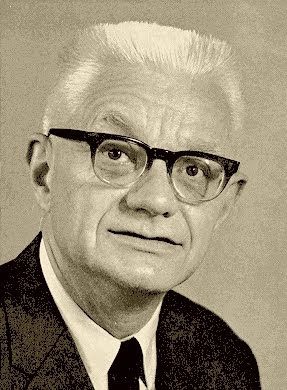Philosophy
 Carl Gustav Hempel
Carl Gustav Hempel
January 8th 1905 to November 9th 1997
Not exactly a household name and a movement, logical positivism/logical empiricist, that has fallen out of favor much like many others.
German-born U.S. philosopher who was one of the leaders of the Berlin school of logical positivism. The group viewed the task of science as that of showing phenomena to be the consequence of unbroken laws. He emigrated to the USA in 1937 because of Nazism. With Paul Oppenheim, he published an account of the deductive- nomological explanation. In this model, the explanation of a fact is reduced to a logical relationship between statements: the explanandum is a consequence of the explanans. This is a common method of logical positivism. Pragmatic aspects of explanation are not taken into consideration. Another feature is that an explanation requires scientific laws; facts are explained when they are subsumed under laws.
"In Memoriam: CARL GUSTAV HEMPEL (January 8th 1905–November 9th 1997)" by Richard Jeffrey
Carl Gustav Hempel (1905—1997) [Internet Encyclopedia of Philosophy]
Carl Gustav Hempel [Wikipedia]
- The Bell Curve And Logical Positivism
Two more today. Continuing on in the line of favorite former students, bkriplur asks, What do you think of Herrnstein & Murray's The Bell Curve? You mentioned it in one of your earlier posts and I was curious about your opinion on it.It's a good...
- Psychophysical Parallelism Explained
Gustav Theodor Fechner (1801-1887)Theory of psychophysical parallelism states that mental and physical experiences occur simultaneously and are not necessarily bound by any causal interaction. The theory was established in the early 19th century by a...
- God's Identity Crisis
Religions are wacky in all sorts of ways, but at the heart of Christianity there is a logical problem so deep, one has to wonder how on earth it's possible for people to actually believe it... and no, I'm not talking about the fact God basically...
- "mistaken Identity And Mirror Images"...quirky Stories
Albert Einstein accepted a “special” visiting professorship at the University of Leiden in the Netherlands in February 1920. Although his appointment should have been a mere formality, it took until October of that year before Einstein could occupy...
- Science Limits
"The Limits of Science—and Scientists" by Ananyo Bhattacharya Discover Magazine “About what one can not speak, one must remain silent.” The last line of Ludwig Wittgenstein’s Tractatus tends to resonate with scientists, sceptics, atheists, and...
Philosophy
Carl Gustav Hempel...logical positivism/logical empiricism
 Carl Gustav Hempel
Carl Gustav HempelJanuary 8th 1905 to November 9th 1997
Not exactly a household name and a movement, logical positivism/logical empiricist, that has fallen out of favor much like many others.
German-born U.S. philosopher who was one of the leaders of the Berlin school of logical positivism. The group viewed the task of science as that of showing phenomena to be the consequence of unbroken laws. He emigrated to the USA in 1937 because of Nazism. With Paul Oppenheim, he published an account of the deductive- nomological explanation. In this model, the explanation of a fact is reduced to a logical relationship between statements: the explanandum is a consequence of the explanans. This is a common method of logical positivism. Pragmatic aspects of explanation are not taken into consideration. Another feature is that an explanation requires scientific laws; facts are explained when they are subsumed under laws.
"In Memoriam: CARL GUSTAV HEMPEL (January 8th 1905–November 9th 1997)" by Richard Jeffrey
Carl Gustav Hempel (1905—1997) [Internet Encyclopedia of Philosophy]
Carl Gustav Hempel [Wikipedia]
- The Bell Curve And Logical Positivism
Two more today. Continuing on in the line of favorite former students, bkriplur asks, What do you think of Herrnstein & Murray's The Bell Curve? You mentioned it in one of your earlier posts and I was curious about your opinion on it.It's a good...
- Psychophysical Parallelism Explained
Gustav Theodor Fechner (1801-1887)Theory of psychophysical parallelism states that mental and physical experiences occur simultaneously and are not necessarily bound by any causal interaction. The theory was established in the early 19th century by a...
- God's Identity Crisis
Religions are wacky in all sorts of ways, but at the heart of Christianity there is a logical problem so deep, one has to wonder how on earth it's possible for people to actually believe it... and no, I'm not talking about the fact God basically...
- "mistaken Identity And Mirror Images"...quirky Stories
Albert Einstein accepted a “special” visiting professorship at the University of Leiden in the Netherlands in February 1920. Although his appointment should have been a mere formality, it took until October of that year before Einstein could occupy...
- Science Limits
"The Limits of Science—and Scientists" by Ananyo Bhattacharya Discover Magazine “About what one can not speak, one must remain silent.” The last line of Ludwig Wittgenstein’s Tractatus tends to resonate with scientists, sceptics, atheists, and...
